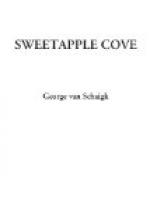“I had no idea there would be enough people here to make these paths,” I said to Dr. Grant. “And why do so many of them cross from time to time?”
“They are made by the caribou, every one of them,” he replied. “Most of these have been abandoned for a long time. The people of the Cove sometimes come as far as this, and by dint of firing their heavy sealing guns loaded with slugs they may have made the deer shy. We shall soon see plenty of tracks, for the hunters seldom go farther than this, Sammy tells me. You see, they would have a hard time bringing the meat home. They have to sled it out with dogs or carry it on their backs. We are going farther, since we are not looking for a whole winter’s provision.”
The barren over which we traveled was beginning to be much wider, and the clumps of straggling trees less frequent. Far away there was a range of little mountains, tinted with purples and lavenders, rather indistinct in the distant haze. The sun was lighting up bright spots where the peat bogs held miniature lakes, among which were tiny islands of bushes and low trees dotting the great marsh. Here and there small tamaracks stood quite apart, as if their ragged dress had caused them to be ostracized by the better clad spruces and firs.
Suddenly the men stopped near a little tree, and I saw that much of its brown bark had been stripped off. On the white wood beneath there were some curious dark red spots.
“A big stag has been rubbing his horns here within a day or two, Miss Jelliffe,” the doctor told me. “You ought to see one of them at work. Their horns must itch desperately when they are ready to shed their velvet, for they hook away at these saplings as if they were actually fighting them. Such blows as they give; one can hear them quite far off. Look at this place where the wood has actually been splintered off. These marks are dried blood. And now look down at your feet. This fellow is surely a big one, the ground is soft and he has left a huge track. You will notice that the toes are widely separated, and that the dew claws have also left their mark. No other deer than the caribou ever make that fourfold imprint, and they only do it on muddy ground or in snow.”
“How I wish I could see him!” I cried, excitedly.
He had taken out a pair of field glasses, and was sweeping the great barren with them.
“One does not often see the stags on the marsh at this time of the year,” he said. “They usually remain in their lairs among the alders on the edges of ponds and streams. But I think I see something.”
I strained my eyes in the same direction. Far away, against the sky-line, I thought I discerned little dark dots which appeared to be moving, and the doctor handed me the glasses.
“You are far-sighted,” he said. “I see that your eyes have caught them. Now take a nearer look at them.”
“Oh! I can see them ever so plainly now,” I exclaimed.




